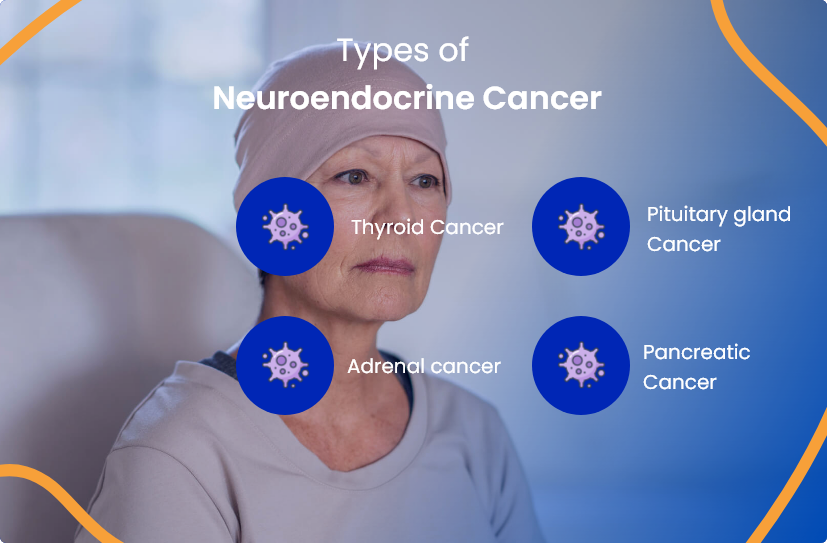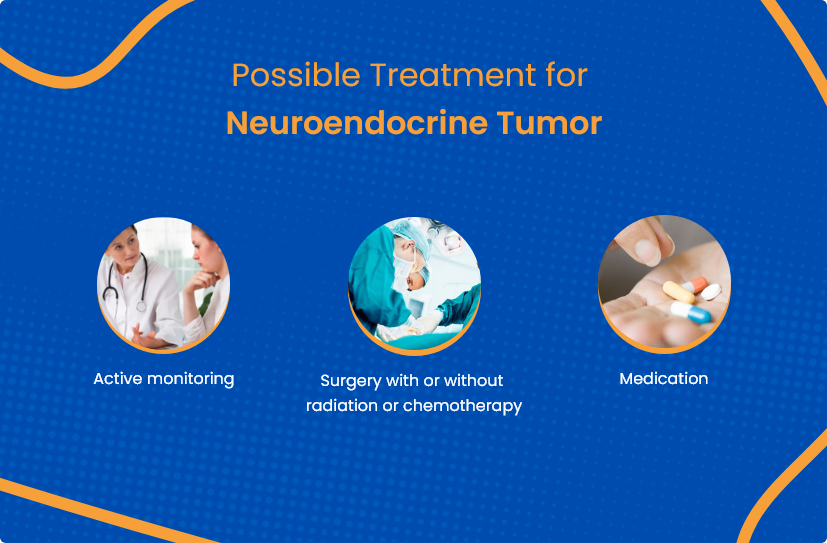
Book a Consultation
Thank you!
Your form has been sent successfully.

A neuroendocrine tumor (NET) is a rare tumor (which accounts for only 0.5% of all tumors in the United States) that can grow in a variety of body organs. It affects the cells that secrete hormones in the blood (neuroendocrine cells). Most NETs are found in the abdomen, particularly in the gastrointestinal tract. However, they can also develop in the pancreas, adrenal glands, and lungs.
Neuroendocrine tumors (NET) come in a variety of forms. They usually have names based on the type of cell they develop into or the hormone they produce. Any of the main endocrine glands, such as the thyroid, pituitary, adrenal, or pancreatic glands, can also develop tumors.

The thyroid gland is where thyroid cancer begins. It is the most common type of endocrine cancer in the body. The majority of thyroid tumors, or nodules, are not malignant. However, these tumors can impair the patient’s ability to function. These malignant cells can also spread to other organs.
The pituitary gland, a pea-sized structure connected to the brain, creates hormones that affect fertility and growth. Although pituitary tumors are often benign, they can cause one or more hormones to be produced in excess or insufficiently, which might disturb the equilibrium of other hormones and affect body functions.
It is a rare form of cancer that develops in either one or both of the tiny, triangular glands (adrenal glands) located above the kidneys. The majority of growths that develop in the adrenal glands are benign (noncancerous).
Cancer that begins in the pancreas is called a pancreatic neuroendocrine tumor (NET). Islet cell malignancies, commonly known as pancreatic neuroendocrine tumors, are rare. One outcome is that cells may start to multiply and subsequently form a mass, which is a collection of malignant cells. On occasion, cancer cells might separate and spread to different organs, like the liver.
It is rare for these tumors to cause symptoms at first. Patients may experience symptoms depending on their origin and whether they produce excess hormones.
General symptoms of neuroendocrine tumors include:
 Pain from a growing tumor
Pain from a growing tumor
 Feeling a lump growing beneath the skin.
Feeling a lump growing beneath the skin.
 Excessive fatigue
Excessive fatigue
 Weight loss
Weight loss
Functional tumors are neuroendocrine tumors that overproduce hormones. Symptoms of functional tumors (creating excess hormones) are:
 Skin blushing
Skin blushing
 Diarrhea
Diarrhea
 A tendency to urinate frequently
A tendency to urinate frequently
 Excessive thirst
Excessive thirst
 Dizziness
Dizziness
 Lack of stability
Lack of stability
 Rashes on the skin
Rashes on the skin
Treatment options vary for neuroendocrine tumors, depending on the type, location, and any symptoms associated with a tumor producing excess hormones.

Doctors may advise active surveillance if the tumor is slowly expanding. Active surveillance is routine basically monitoring without specific treatment.
Surgery may be used to remove the tumor if it has not spread past the organ of origin. Tumors can be reduced with surgery and further treated with Chemotherapy or radiation therapy. In order to treat advanced gastrointestinal and pancreatic neuroendocrine cancer, doctors sometimes utilize the FDA-approved peptide receptor radionuclide treatment.
Doctors may suggest drugs to treat your symptoms if your neuroendocrine tumor secretes too many hormones. Doctors may also prescribe somatostatin analogs, including octreotide and lanreotide. These are medications that reduce the number of hormones produced by the body and may help with symptoms. Usually, they are injected into the body every 28 days.
Neuroendocrine tumors can be challenging to diagnose because their symptoms are often nonspecific. Depending on where in your body the tumor is, patients may undergo several tests and treatments.
In general, tests to diagnose neuroendocrine tumors could consist of:

A physical examination would help the doctor better understand the symptoms and signs. A doctor might feel for enlarged lymph nodes or look for signs that an abssess is secreting too many hormones.

Neuroendocrine tumors can occasionally produce extra hormones, which doctors may recommend testing for in blood or urine.

To create images of the mass or abssass, patients may undergo imaging tests including ultrasound, CT, and MRI. Positron emission tomography (PET), which uses a radioactive tracer injected into a vein to produce images, is sometimes used to diagnose neuroendocrine tumors.
Our patients have access to a multispecialty team of professionals at ACTC, who work together in a highly collaborative and coordinated manner to provide all aspects of cancer care in one convenient location, i.e., Brooksville, Florida. Our doctors are supported by a clinical team with over two decades of experience and a reputation for providing tailored and supportive cancer care.
The following are our providers who you can consult at ACTC:

MD, Hematology & Oncology

MD, Ph.D., Hematology/ Medical Oncology

MD, Radiation Oncologist

Once diagnosed with cancer, you face a series of hard choices. Our experts at ACTC will guide you and your family through every step of cancer treatment. With state-of-the-art technology and experienced cancer specialists, ACTC promises its patients world-class healthcare.
Schedule a consultation by calling
 352-345-4565
352-345-4565
It is a tumor that forms when cells release hormones into the blood in response to a nervous system signal. Hormonal production may exceed normal amounts in neuroendocrine tumors, creating a variety of symptoms. It is possible for these tumors to be benign (not cancerous) or malignant (cancerous).
Neuroendocrine cancers usually take three to five years to develop. Carcinoid tumors, on the other hand, may take more than ten years.
Neuroendocrine tumors are slow-growing when compared to more prevalent malignant tumors, but they can produce amino acids that have serious side effects.
Schedule a consultation by calling
 352-345-4565
352-345-4565